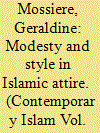|
|
|
Sort Order |
|
|
|
Items / Page
|
|
|
|
|
|
|
| Srl | Item |
| 1 |
ID:
113237


|
|
|
|
|
| Publication |
2012.
|
| Summary/Abstract |
This paper seeks to discuss Malay identity as it has been understood by the Malay Muslim religious elites (the Ulama) in Malaysia. I posit that the Ulama's voices have been privileged in the context of the Islamic resurgence period. Although there has been a general consensus by the Ulama that Islam is a key component of the Malay identity and that the two are inseparable, the Ulama are, at present, divided in the contest for a clear definition of what 'Islam' is and how Malayness can be refashioned towards Islam. By couching these debates and contestations within the context of the Islamic resurgence period and the state's Islamisation project, I shall highlight the ways in which issues such as Malay rites, rituals and cultural practices, and what constitutes bid'ah (sinful innovations) in Islam are elucidated. The works and sermons of three key Ulama in contemporary Malaysia-Nik Aziz, Mohd Asri, and Harussani Zakaria-shall be treated as case studies. Their attitude towards other key markers of Malayness, such as the Malay Royalty and Malay language, and how they are negotiated in relation to Islam are also examined.
|
|
|
|
|
|
|
|
|
|
|
|
|
|
|
|
| 2 |
ID:
113236


|
|
|
|
|
| Publication |
2012.
|
| Summary/Abstract |
My ethnographic fieldwork conducted with female converts to Islam in France and in Quebec (Canada) shows that, for these women, being Muslim does not necessarily mean wearing clothes with 'oriental' designs. Rather, they are starting their own clothing companies so as to produce distinct Muslim-Western fashions that they promote through the Internet. By interpreting Islam in a context where Muslims are a minority religious group, converts construct alternative religious and social representations of Muslim identity that accord with their feminist interpretation of the Qu'ran while simultaneously incorporating the Western background within which they were socialized. In this regard, the strategies that they develop for wearing the veil and for integrating into their environment (family, workplace, etc.) make it clear that fashion, religion and politics are interacting in multiple, creative ways. In this paper, I look at how new Muslim feminist subjectivities are produced and realized through habits of dress, resulting in new representations of the body. I explore this issue by considering dress and hairstyle strategies developed by Muslim converts, in order to examine new perspectives on the place of gender in religion as it relates to particular social contexts.
|
|
|
|
|
|
|
|
|
|
|
|
|
|
|
|
| 3 |
ID:
113238


|
|
|
|
|
| Publication |
2012.
|
| Summary/Abstract |
Recent scholarly interest in religions and ecology reaffirm the importance of religious models in understanding humanity's place in nature. While Islam provides detailed ethical principles on the environment, the majority of Muslim majority countries show an apparent indifference to environmental issues. Due to the complexities in Muslim majority countries in relation to environmental issues, this paper contends that there is a need for an examination of the different aspects of Muslim environmentalism, and to what extent environmental practices are influenced by Islamic environmental ethics. Therefore, this paper develops a multi-pronged approach whereby both environmental and non-environmental practices by Muslims are discussed, giving an overview of Islamic attitudes towards ecology and environmental practices and suggesting reasons for Muslim non-concern for the environment. Moreover, the paper illustrates how Muslims in western and Muslim majority countries implement Islamic environmental ethics. Finally, western and eastern Muslim thinkers who have written on Islam and the environment are explored.
|
|
|
|
|
|
|
|
|
|
|
|
|
|
|
|
| 4 |
ID:
113239


|
|
|
|
|
| Publication |
2012.
|
| Summary/Abstract |
After the dissolution of the Soviet Union, translations of the Qur'an and books of hadiths became widely available in Kazakhstan for the first time in 70 years. However, most Kazakhs do not read the Qur'an or books of hadiths on a regular basis. This essay examines the ways in which two young Kazakh woman who do read the Qur'an and hadiths learned to interpret and use these texts. I describe how the first young woman, who is a member of the piety movement in Kazakhstan, reads the Qur'an and books of hadiths on a daily basis using a schema that emphasizes the Prophet, the Qur'an, hadiths, and the differences between Muslims and non-Muslims. The second young woman, who is a member of Ata Zholy, an Islamic movement in Kazakhstan that focuses on revitalizing Kazakh traditions, reads these texts only occasionally and uses a schema that emphasizes ancestors, saints, tradition, and linking contemporary Kazakhs with an idealized Kazakh Islamic past. I link the ways that these two women learned their respective interpretive schemas to their family's practice of Islam and, more broadly, to the restriction of Islamic practice in the Soviet era.
|
|
|
|
|
|
|
|
|
|
|
|
|
|
|
|
|
|
|
|
|